This brief shares findings and recommendations from participatory activities with Syrian women and girls living as refugees in Al Azraq camp, Jordan. It condenses learning from “contextualization workshops” with a core group of 34 women and girls, as well as participatory group discussions (PGDs) with 40 refugee men and boys, on risks for sexual exploitation and abuse when accessing different types of aid. This brief is also available in Arabic.
Case Study Library
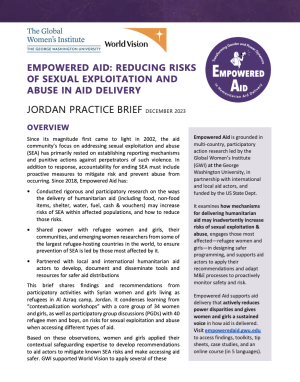
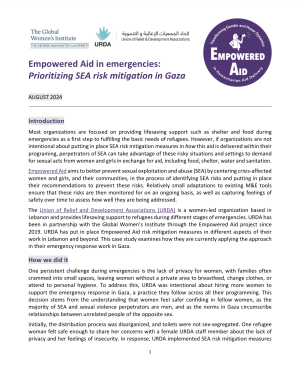
Empowered Aid in Emergencies: Prioritizing SEA Risk Mitigation in Gaza
Since 2019, the Union of Relief and Development Associations (URDA) has put in place Empowered Aid risk mitigation measures in different aspects of their work in Lebanon and beyond. This case study examines how they are currently applying Empowered Aid's approach in their emergency response work in Gaza.
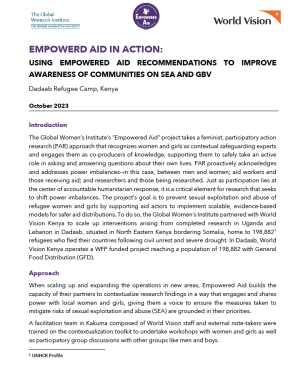
Using Empowered Aid Recommendations to improve Awareness of Communities on SEA and GBV
This case study outlines how the World Vision team in Kenya, with support from the GWI team, facilitated awareness sessions on SEA and GBV with community members based on recommendations from women and girls living in Dadaab refugee camp.
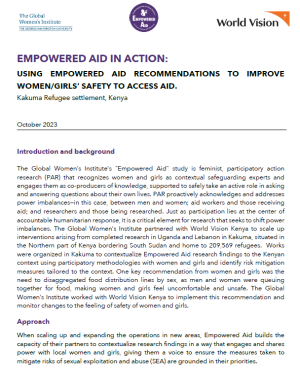
Using Empowered Aid Recommendations to Improve Women's and Girl's Safety to Access Aid
This case study outlines how to take a recommendation from affected communities; in this case a request for sex-segregated distribution lines from refugee women and girls in Kakuma refugee settlement, and work with a distribution team to implement a logistics-based recommendation.
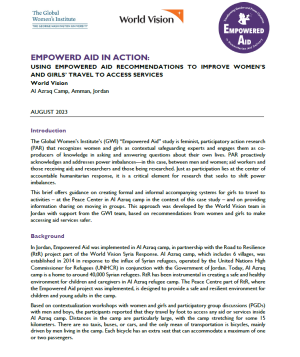
Using Empowered Aid Recommendations to Improve Women's & Girls' Travel to Access Services
This case study describes the process the World Vision team in Jordan, with support from the GWI team, approached the decision to create and the process of implementing formal and informal accompanying systems for girls to travel to activities at the Peace Center in Al Azraq camp in Jordan, and reflections on providing information sharing around moving in groups.
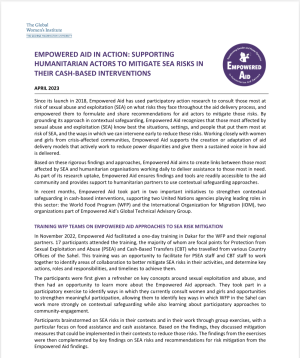
Supporting Humanitarian Actors to Mitigate SEA Risks in their Cash-Based Interventions
This case study is based on a one-day training that took place in Dakar for the WFP and their regional partners. This training was an opportunity to facilitate for PSEA staff and Cashed Based Transfers staff to jointly identify areas of collaboration to better mitigate SEA risks in their activities, and determine key actions, roles and responsibilities, and timelines to achieve them.
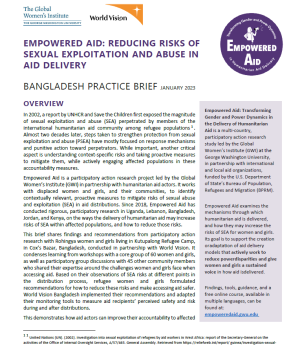
Empowered Aid: Reducing Risks of Sexual Exploitation and Abuse in Aid Delivery
This brief shares findings and recommendations from Empowered Aid's implementation with women and girls living in Kutupalong Refugee Camp, in partnership with World Vision U.S. and World Vision Bangladesh. This brief demonstrates how aid actors can improve their accountability to affected populations by putting the expertise of women and girls into action and responding to their feedback with tangible changes to the ways they deliver aid and monitor risks of SEA associated with distributions.
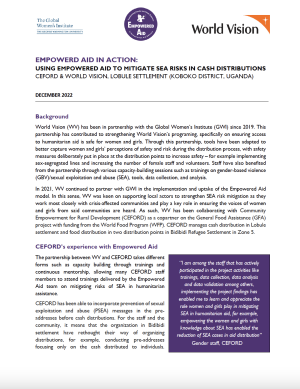
Using Empowered Aid to Mitigate SEA Risks in Cash Distributions
This case study serves as a product of World Vision's continued to partnership with GWI in the implementation and uptake of the Empowered Aid model. WV was keen on supporting local actors to strengthen SEA risk mitigation as they work most closely with crisis-affected communities and play a key role in ensuring the voices of women and girls from said communities are heard. As such, WV has been collaborating with Community Empowerment for Rural Development (CEFORD) as a copartner on the General Food Assistance project with funding from the World Food Program.
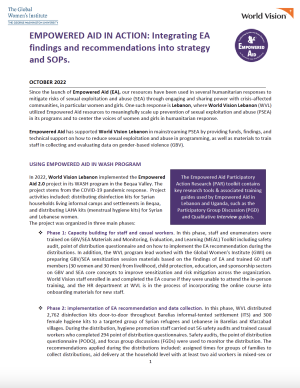
Integrating Empowered Aid Findings and Recommendations into Strategy and SOPs
This case study outlines how Empowered Aid our resources have been used in several humanitarian responses to mitigate risks of sexual exploitation and abuse through engaging and sharing power with crisis-affected communities. One such response is Lebanon, where World Vision Lebanon utilized Empowered Aid resources to meaningfully scale up prevention of sexual exploitation and abuse in its programs and to center the voices of women and girls in humanitarian response.
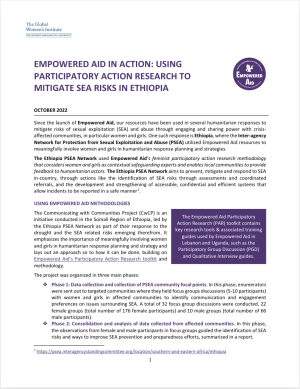
Using Participatory Action Research to Mitigate SEA Risks in Ethiopia
In this case study, it is made clear how Empowered Aid resources have been used in several humanitarian responses to mitigate risks of sexual exploitation (SEA) and abuse through engaging and sharing power with crisis affected communities, in particular women and girls. One such response is Ethiopia, where the Inter-agency Network for Protection from Sexual Exploitation and Abuse utilized Empowered Aid resources to meaningfully involve women and girls in humanitarian response planning and strategies.
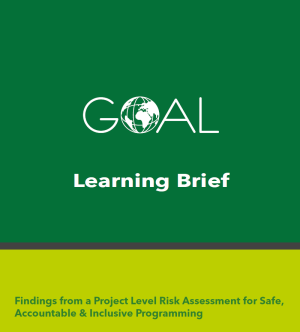
This case study outlines how GOAL Syria, in undergoing Safeguarding, Protection, and Gender Equality and Social Inclusion (GESI) action planning, adapted an piloted a risk assessment tool for safe, accountable, and inclusive programming. This tool was accompanied by tools adapted from the Empowered Aid toolkit. The authors discuss lessons learned from this preventative approach towards safeguarding, inclusion, and gender-related risks to ensure safer programming with greater accountability and inclusivity.
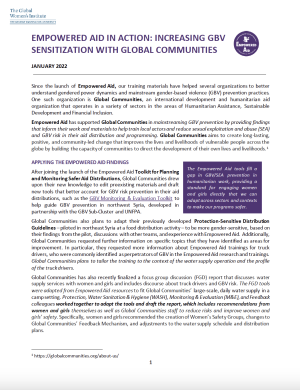
Increasing GBV Sensitization With Global Communities
This case study exemplifies how Empowered Aid training materials have helped several organizations to better understand gendered power dynamics and mainstream gender-based violence (GBV) prevention practices. One such organization is Global Communities, an international development and humanitarian aid organization that operates in a variety of sectors in the areas of Humanitarian Assistance, Sustainable Development and Financial Inclusion. Empowered Aid has supported Global Communities in mainstreaming GBV prevention by providing findings that inform their work and materials to help train local actors and reduce sexual exploitation and abuse and GBV risk in their aid distribution and programming.
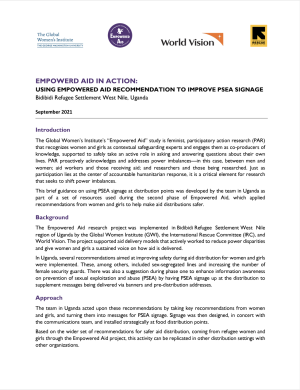
Using Empowered Aid Recommendations to Improve PSEA Signage
This case study provides guidance on using PSEA signage at distribution points. The study was developed by the team in Uganda as part of a set of resources used during the second phase of Empowered Aid, which applied recommendations from women and girls to help make aid distributions safer.

